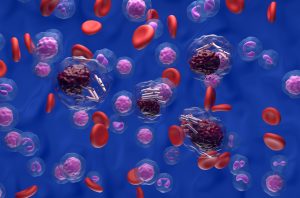Dr. Joel Silver
How do myeloma and chronic lymphocytic leukemia (CLL) develop? What are some risk factors associated with those malignancies?
A. We don’t know what causes CLL. We do know that people in some occupations or with a certain exposure history might be at higher risk, and that CLL generally affects older people. Treatment fortunately is not needed in many cases, but even so our treatment options have evolved based on cytogenetics and next-generation sequencing. We have more ways to assess prognostic features and design more personalized and potentially more effective therapy for people with CLL.
What therapies have been successful in treating CLL over the last two to three years?
A. If you can identify a certain kind of CLL, such as IDH-mutated CLL, some of the patients with it can receive a standard chemotherapy regimen called FCR, and they sometimes go into remission indefinitely. It depends on whether the patient is young and healthy enough to tolerate the therapy. That’s a select group, though; you don’t see too many young people with CLL.
Years ago, an effective treatment did not exist for another group of patients with CLL, those with the genetic 17p deletion. In recent years, however, the oral agent ibrutinib has shown effectiveness for CLL in this group. Other therapies now are available for patients who don’t respond to ibrutinib.
Where does targeted therapy come into play?
A. In general, “targeted therapy” refers to a treatment based on a particular mutation or pattern. The presence of the genetic 17p deletion in CLL is one example, but this is a bad cytogenetic abnormality for which standard treatments such as chemotherapy haven’t worked. If we can identify a particular mutation, then we can target our therapy and plan treatment that we know will work, instead of going through chemotherapies that are only partially effective or downright ineffective and then finding that the patient is resistant to treatment.
Are there side effects or drawbacks to targeted therapy?
A. Everything we do has side effects. The oral agent ibrutinib has been an effective first-line therapy for any type of CLL. Although the agent is specifically for patients with 17p deletion, it has also worked for patients without that genetic feature. While some cardiovascular and bleeding issues have been reported, ibrutinib overall is more tolerable than chemotherapy.
When we medically examine patients with CLL, we always look at a pattern of mutations to try to identify how to treat these people — not so much from an immediate therapeutic standpoint, but to gain knowledge of all these other cytogenetic abnormalities so that eventually, we will find other ways to target those different patterns.
What important points do you address with patients before they begin CLL therapy?
A. Many people with CLL don’t die of their disease, they die with their disease, so I tell patients not to be afraid of the disease itself. Many of the conversations we have with these people, however, revolve around the fact that they have this problem but may never need treatment. “We should follow you because you may need treatment down the line,” I tell them. “If you need treatment, we have many effective therapies.”
Do you foresee different therapies for CLL emerging within the next two to three years?
A. A number of medications are on the horizon that will be appropriate for any patient with CLL. For example, venetoclax, which gained FDA approval last year, is indicated for second-line treatment of CLL in patients with the 17p deletion, but I think that agent will be effective for all patients with CLL. As similarly versatile agents are developed, we will have many more treatment options.









